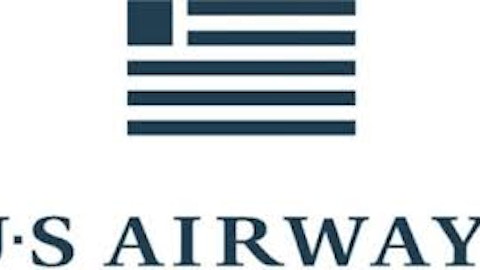However, with most of the integration issues already tackled by the company in 2012, I see 2013 to be a better year for the company along with the improving global outlook. United Continental is targeting towards lowering its costs in 2013 to improve its financial performance. It is cutting down its management and administrative headcount by around 6% in 2013. Moreover, it started a recent initiative of ~$550 million investment towards in-flight improvements for installation of flat-bed seats in premium cabins. This would be installed in around 180 aircraft in 2013 giving it the highest number of flat-bed seats among the US carriers. All these initiatives are expected to boost up the consolidated PRASM (passenger revenue per available seat) in 2013.
Southwest Airlines Co. (NYSE:LUV) – Catching up the lane
Southwest last month reported its fourth quarter and full year results for 2012. The company’s 4Q12 net income decreased by ~48%; to $78 million y/y. In spite of high fares, the profit dropped mainly due to the rising cost of labor, fuel and maintenance. For the full year 2012, the company posted profits of ~$417 million which increased by ~26% as compared to 2011. This was Southwest’s 40th consecutive year in which it was able to report profits. This came as further relief to the shareholders who already are in high spirits with the stock price regaining the lost momentum. Following the recent merger in the Airline industry, players like Southwest will be the beneficiaries. As the major big players are aiming at high-value international destinations, Southwest shall look out for the opportunities to expand its market share in the domestic market. The company is well-placed to capitalize on this opportunity because of its strong nationwide presence.
Another factor for Southwest which can be seen as the immediate revenue generator is its new innovative products. They include –
1). $40 per flight as an early boarding charge will be asked from the passengers who want to buy a preferred place in the boarding group
2). Increase in the Early Bird (automatic check-in before the traditional check-in) charge to $12.50 from the current level of $10 per one-way ticket
3). A special ‘no-show’ charge for the customers that do not inform about their no-show or cancel well on time.
4). Increase in fees for various types of checked baggage.
All these initiatives will help the company to generate an additional ~$100 million of revenue in 2013. I feel 2013 will be a fruitful year for the company with the expected benefits from the merger along with its incremental revenue generating strategies.
Conclusion
Following the recent round of the airlines merger, all the players in the industry are planning their future strategies accordingly. Both Delta and Southwest are not likely to see much of the impact of this merger in their operations. Both the companies are well-positioned with their strategic deals and initiatives aiming at higher revenues in 2013. On the other hand, United Continental will witness certain headwinds from the airline merger due to the increased competition. However, the company’s cost cutting as well as operational improvement initiatives will provide the much needed support to its earnings.
Going Macro, the global airline industry is exhibiting good signs of profitability. The airline index for the US has started the year with a 15% growth YTD in January, 2013 as compared to Europe with 12% and Asia with 5%. I believe the fundamentals in the industry should further improve based on moderate traffic growth and the improved capacity utilization. Looking at this positive outlook, this sector can be a good opportunity for the investors in 2013. With the higher revenues expected, the investors can also look out for better returns this year. I recommend a buy for Delta and Southwest Airlines. However, I am neutral on United Continental.
The article How These Companies Will Bid Against the World’s Largest Airline originally appeared on Fool.com and is written by Madhu Dube.
Copyright © 1995 – 2013 The Motley Fool, LLC. All rights reserved. The Motley Fool has a disclosure policy.



